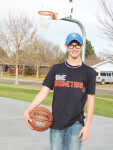Teen focuses on what he can do, instead of what he can't

LORRI SUGHROUE
McCook Daiy Gazette
McCOOK, Nebraska -- Chris Smith of McCook was three years old when he had his first seizure. Diagnosed with epilepsy shortly afterward, at one point he was on several different medications, plus more for side effects.

It opened up a whole new world for his parents, Shane and Deb Smith, of doctor visits, monitoring medication interaction and the constant fear of the next seizure.
Now 14-years-old and seizure-free since 2002, Chris hopes to generate more understanding of the condition that affects nearly three million in the United States.
"It's not my whole life, just a part of it," he said.
He spent about one and a half days in Washington, D. C. this past April, with the Epilepsy Foundation's Kids Speak Up! program, joining more than 50 teens across the U.S. petitioning congressional leaders for more research and public education.
The trip helped Chris to see the big picture, said his dad, Shane.
"Chris was shy at first, but it really opened his eyes to how the political process worked," he said and helped showed Chris he was not alone.
Chris had what is called absence seizures, that made him appear to be daydreaming. Unlike grand-mal seizures that are very obvious, absence seizures are barely perceptible and last less than 10 seconds. Absence seizures occur suddenly, cause the person to "blank out," briefly lose consciousness and just stare, unable to respond to voices.
These seizures caused problems in school for Chris, as it interfered with his learning. It also caused problems in other ways, too, his father said, with bullying. "He wanted to do things other kids were doing, like football, and he couldn't," Shane said.
But after switching schools and finding things he could do, such as basketball and cross county, Chris now is not letting epilepsy get in the way of life.
With November as National Epilepsy Awareness month, understanding the condition is increasing, said Shane.
"Epilepsy awareness is where cancer awareness was about 20 years ago -- people are now starting to talk about it more," he said. For more information, visit www.epilepsyfoundation.org
More about epilepsy
Seizures happen when the electrical system of the brain malfunctions. Instead of discharging electrical energy in a controlled manner, the brain cells keep firing. The result may be a surge of energy through the brain, causing unconsciousness and contractions of the muscles.
| * | Incidence is highest under the age of 2 and over 65. |
| * | Males are slightly more likely to develop epilepsy than females. |
| * | Incidence is greater in African Americans and socially-disadvantaged populations. |
| * | Trends show decreased incidence in children; increased incidence in the elderly. |
| * | 50 percent of people with new cases of epilepsy will have generalized onset seizures. |
| * | 45,000 children under the age of 15 develop epilepsy each year. |
- The Epilepsy Foundation
